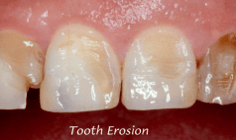We have absolutely no doubt that most of our NYC cosmetic dental patients have no idea that chlorine, as in chlorinated pool water, can damage the enamel on their teeth. We know this because, when we’ve mentioned it to our patients, they’re completely amazed by the possibility that their wonderful, relaxing swimming pool could be anything but wonderful and relaxing!
How Chlorinated Swimming Pool Water Can Damage Your Teeth A 2011 paper written by colleagues at NYU College of Dentistry studies show that improperly maintained swimming pools are a primary culprit in damage to users’ teeth. “What’s that you say?” Yes, that’s right: improperly maintained. It seems that some pool owners decide to maintain their own pools rather than pay a pool company to do the work. That’s all fine and well unless chlorine and pH levels aren’t kept at optimum levels.

According to Dr. Leila Jahangiri, a clinical associate professor and the Chair of NYUCD’s Department of Prosthodontics, “Improperly maintained pool chlorination in swimming pools can cause rapid and excessive erosion of dental enamel. It is a difficult balance to maintain home pools properly.” Jahangiri contends, “Proper pool chlorine and pH levels need to be monitored and maintained on a weekly basis.
Dr. Jahangiri and her NYUCD colleagues Steven Pigliacelli and Dr. Ross Kerr authored a paper based on a 53-year-old male patient who complained of extremely sensitive teeth that had dark stains and enamel loss that had happened very quickly–literally over a 5-month period of time. It started at the same time the patient began swimming 90 minutes daily in his backyard swimming pool. After ruling out any other reason for the man’s rapid dental decline, and testing his pool’s pH levels, improper chlorine levels were found to be at fault.
“If the chemical levels are not properly maintained, pool water contact with teeth can cause serious enamel erosion,” Jahangiri said.
Case studies show that the effect occurs when the pH of the water ranges between 2.7 and 7. When one considers the number of owner-maintained chlorinated pools in the NYC area, the potential for both children and adults people to experience enamel erosion and staining is huge. Please, if you have a pool and you regularly enjoy it, think about having that pool pH checked on a regular basis. You can take a sample into your local pool supply store where they will test the water without charge. Better yet, pay a pool company. It may cost a few thousand dollars every summer to maintain your pool with a professional, but once you have irreversible damage to your dental enamel, it’s, well, irreversible!

.png?width=800&name=Untitled%20design%20(3).png)

